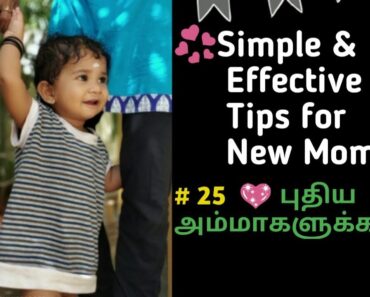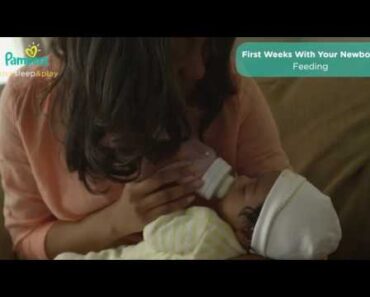Babies may cry during breastfeeding for various reasons ranging from simple distractions to a serious feeding problem.
Although occasional crying during breastfeeding can be normal, frequent cries crying and refusal toe breastfeeding may require medical attention.
Read this post to know more about the various reasons why babies cry while breastfeeding and ways to prevent it.
Causes Of Crying In Babies While Breastfeeding
The following factors or situations may make babies fussy or cry during breastfeeding (1).
1. Distractions
A distracted baby may pull off the breast and often cry while feeding due to real or imaginary distractions.
2. Overactive letdown
Sometimes, if the mother has an overactive or forceful letdown of breast milk, the baby may tend to bite the breast or cry since they cannot swallow too much milk. Hyperactive milk ejection reflex and oversupply may cause gagging or choking while breastfeeding, making your baby cry while nursing.
3. Slow letdown
Slow letdown reflex could cause a slower or inadequate milk supply. Babies may become irritated or cry if they do not get enough milk while breastfeeding.
4. Slow milk flow
Babies can be impatient while waiting for the milk to flow while feeding. Slow milk flow can be due to various reasons, including a slow letdown reflex. Sometimes, a fast milk flow due to overactive letdown followed by a slower flow could make your baby cry since they become frustrated by the changes in the milk flow.
5. Done with feeding
Some babies may cry when they are full and do not want to continue feeding. Once the stomach is full, it is normal for babies to cry if you haven’t ended the feeding session.
6. Want to burp
Babies may cry or pull off the breast if they want to burp while nursing, especially during the first few months. Most babies do this while changing the breast or after feeding, and a few may not burp without the assistance of the parent. Older babies can relieve gas while they move, and it is rare for them to burp while nursing.
Babies who are hungry may swallow more air due to hurrying and later end up burping. Bottle-fed infants may burp more than breastfed infants.
7. Not hungry
Babies who are not hungry may cry while feeding since they do not want to be fed. Crying can be a means of communication for the baby.
8. GERD or acid reflux
Regurgitation of stomach acid to the food pipe could make babies gag or throw up often. Acid reflux may cause irritation or cough and often make babies cry while feeding due to the discomfort.
9. Unusual body odor
Babies may refuse feeding and often cry when they smell a new perfume, soap, or lotion on the breast while feeding since it is unusual for them.
10. Changes in the taste of breast milk
Babies may cry or refuse feeding if the taste or texture of the breast milk changes. Maternal diet, periods, or second pregnancy may cause changes in the milk.
11. Growth spurt
Growth spurts or frequency days are times when your baby has more intense growth. Babies can have many growth spurts during infancy, usually during two to three weeks, six weeks, three months, and six months.
The duration of growth spurts may vary in babies, and it may last for a few days. Babies may appear hungrier and feed more during this time. The baby can be fussy and may cry when feeding while experiencing a growth spurt.
12. Preference for bottle-feeding
Babies who are mostly fed from a bottle may prefer bottle-feeding to breastfeeding due to the bottle’s instant and continuous milk flow. They may also find it is easy to feed from a bottle since it involves minimal effort than feeding from the breasts.
13. Preference feeding from one side
Some babies tend to prefer one-sided feeding due to various reasons, and they may cry if you offer the other breast or change the breast during nursing sessions.
14. Cluster feeding in the evening
Babies may feed more before sleeping in the evening hours, and they can become fussy and cry if you end feeding before they feed enough. A slow letdown of milk during cluster feeding may also irritate the baby and make them cry.
15. Teething
Teething may cause swelling and pain in the gums and often cause difficulty in sucking. It can make the baby cry while nursing due to the discomfort in the gums.
16. Thrush
Thrush, also known as oral candidiasis, is a fungal infection caused by the yeast Candida albicans. You may notice whitish coating of the tongue and oral cavity in this condition. Babies with oral thrush may have difficulty breastfeeding due to mouth dryness, burning, or lack of appetite.
They may cry or become fussy due to thrush while feeding, and often the candida infection can spread to the mothers’ breasts while nursing if it is left untreated.
17. Stuffy nose
Babies may cry while breastfeeding due to breathing difficulties caused by nasal congestion. Common cold or flu can be the reason for congested or stuffy noses in many babies. Blocked nose due to an inappropriate breastfeeding position may also cause feeding problems.
18. Food sensitivity or allergy
Babies with food sensitivities or allergies may cry during breastfeeding due to gastrointestinal discomforts. Colic, vomiting, gagging, excessive gas, diarrhea, or skin rashes can be symptoms of sensitivity to foods in mom’s diet.
19. Ankyloglossia or tongue-tie
Tongue-tie is a condition wherein a tight and thick band of tissue tethers the tip of the tongue to the mouth’s floor. This condition could affect babies’ ability to suck, and they may turn fussy or cry while breastfeeding.
20. Stress
Babies may feel stressed for various reasons, such as teething, physical illnesses, or even psychological problems, such as fear of being away from the caregiver or parent (separation anxiety). Stress may cause the baby to be irritated and often cry more than usual, including during the nursing sessions.
21. Tiredness
Illnesses or lack of sleep could make babies cry while feeding, and you may also notice them being more irritable in such situations.
Babies may become fussy or cry while breastfeeding due to various reasons. Some babies may go into a nursing strike or breastfeeding strike due to these factors. Breastfeeding strike is a sudden refusal of breastfeeding for several days. It is essential to identify the exact reason behind crying while nursing since adequate feeding is required for your baby’s growth and development.
How To Prevent Crying While Nursing?
Sometimes, it can be difficult for parents to find and resolve the cause of crying while nursing. If your baby frequently cries while breastfeeding or if you are unable to identify the cause, seek help from a pediatrician or a lactation consultant.
The following ways may help calm a crying baby while nursing (1).
- Nurse when the baby is relaxed. You may choose before their sleeping time since babies are less likely to be fussy during this time.
- Take the baby outdoors and feed afterward.
- If the mother is stressed or depressed, the other family member or caregiver may carry the baby until the mom relaxes since babies can often sense emotions.
- Find a calm and dark feeding room or area to reduce distraction.
- Express and bottle-feed breast milk if the baby refuses to feed from the breast. Shift to formula milk only when there is not enough milk supply and after seeking advice from a lactation consultant or pediatrician.
- Do not force the baby to feed if they refuse to feed.
- Feed from both breasts, and switch the breasts if they cry.
- Opt for surgical repair of tongue-tie after consulting a doctor.
- Treat stuffy nose, thrush, etc. to avoid feeding difficulties.
- Offer a pacifier for a while, and continue feeding after the baby relaxes.
- Maintain a healthy diet and drink enough water if you are a lactating mother. The maternal diet could be linked to food sensitivity in breastfed infants. Speak to a doctor if you suspect your baby is reacting to the maternal diet.
If your baby cries while nursing, never force them to feed immediately since it may lead to gagging or choking on breast milk. Give them time to relax while you check for the reason for crying.
Exclusive breastfeeding is recommended for the first six months of life, as it provides nutrition and enhances the bonding between the mother and the baby(2). Do not switch to formula feeding, bottle feeding, or weaning without expert advice if your baby refuses to breastfeed. You may consult a certified lactation consultant for personalized feeding advice based on specific challenges faced while breastfeeding.

































